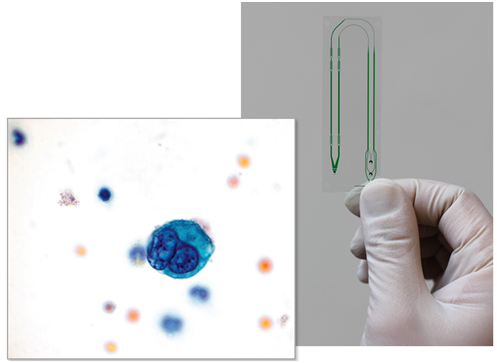Miniature chip detects rogue cancer cells
April 9, 2013

A cancer cell (left) can cause havoc if it enters the bloodstream. Researchers use micro-scale instruments (right) to hunt for cancer cells in blood samples. (Credit: (left) Emre Ozkumur, (right) Berkin Cilingiroglu/National University of Singapore)
Researchers at at Massachusetts General Hospital have developed a device that can detect even a single cell of any type of cancer circulating in blood, allowing early treatment of metastasis and new insights into cancer genetics, Science Now reports.
Called the CTC-iChip system (the “i” is for “inertial focusing”), it targets blood cells instead of cancer cells. Sorting by cell size, the first chip skims off small red blood cells and platelets, letting only CTCs and white blood cells flow past. Then, a second chip winds the cells through curving channels, channeling the remaining cells into a single-file line.
Magnetic beads the size of a bacterium attach to specific surface proteins on white blood cells, and a magnetic field nudges these cells out of the stream of CTCs. That leaves just the CTCs, which can be collected in a vial and individually analyzed by conventional lab methods.
Early CTC detection allows doctors to begin antimetastatic treatments, says lead author Emre Ozkumur, a biomedical engineer who co-developed the system, potentially slowing or stopping cancer’s final, fatal onslaught.